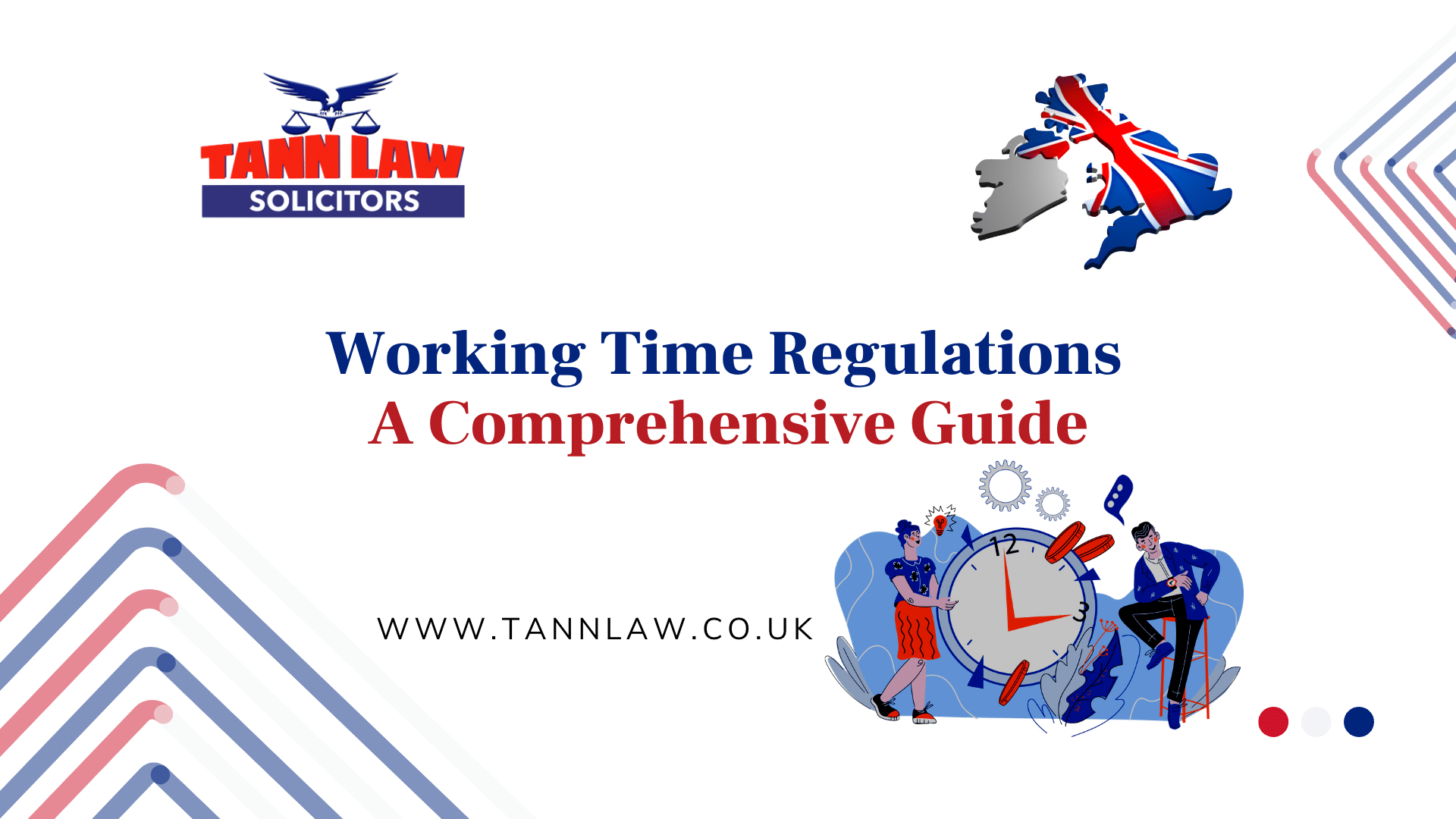At Tann Law Solicitors, we understand that navigating employment law can be daunting, especially when it comes to working time regulations. As a responsible employer, it’s crucial to stay informed on the legal requirements that govern the hours your employees work. In this comprehensive guide, we will provide you with everything you need to know about working time regulations in the UK.
The Working Time Regulations in the UK is a critical aspect of employment law that governs the working hours of employees. It is essential for both employers and employees to understand their rights and obligations under the regulations. In this guide, we will provide a comprehensive overview of the Working Time Regulations in the UK, including what they entail, how they work, and what employers and employees need to know to ensure compliance.
What are the Working Time Regulations in the UK?
The Working Time Regulations in the UK (WTR) are a set of rules that dictate the maximum number of hours an employee can work in a week. They are a set of laws that provide rights and protections to workers in the UK. They also stipulate the minimum amount of rest breaks and time off that employees are entitled to. The regulations set out the minimum rest breaks, daily and weekly rest periods, and the maximum weekly working time for workers.
The WTR applies to most workers, including full-time, part-time, temporary, and agency workers. The regulations also apply to employees who work remotely or from home. However, there are some exemptions, including senior managers, the armed forces, and emergency services personnel.
The regulations apply to all employees in the UK, including part-time workers and agency staff.
The Maximum Working Time
The WTR sets a limit on the maximum number of hours that an employee can work in a week. This limit is set at an average of 48 hours per week, over a 17-week period. However, employees can choose to opt-out of this limit, but they must do so in writing, and it cannot be a requirement for the job.
Rest Breaks and Daily Rest
Employees are entitled to a rest break of at least 20 minutes if they work for more than six hours a day. They are also entitled to a daily rest of at least 11 consecutive hours between working days. Employers must ensure that employees take their rest breaks and daily rest periods.
Weekly Rest
Employees are entitled to a rest period of at least 24 hours in every seven-day period, or two consecutive days in every 14-day period. Employers must provide their employees with a weekly rest period, which cannot be averaged over a two-week period.
Holiday Entitlement
All employees are entitled to a minimum of 5.6 weeks’ paid holiday per year. This includes bank holidays. Employers can choose to offer more holiday entitlement than this.
Employment Contracts
Employment contracts must include the terms and conditions of the working time arrangements. Employers must ensure that their employees understand their rights and obligations under the WTR. If employers do not comply with the WTR, they can face legal action, and employees can make claims for compensation.
How to Ensure Compliance with the Working Time Regulations in the UK
- Keeping accurate records: Employers must keep accurate records of their employees’ working hours and breaks. This will help to ensure that employees do not exceed the maximum working hours, and that they are entitled to the minimum amount of rest breaks and time off.
- Reviewing employment contracts: Employers must review their employment contracts to ensure that they comply with the Working Time Regulations in the UK. Contracts should include clauses that specify the maximum number of working hours per week, rest breaks, and time off entitlement.
- Monitoring working hours: Employers must monitor their employees’ working hours to ensure that they do not exceed the maximum working hours. This includes any overtime hours worked, which must also be recorded.
- Providing training: Employers should provide training to their employees on their rights and obligations under the Working Time Regulations in the UK. This will help to ensure that employees are aware of their entitlements and do not inadvertently breach the regulations.
Employees can ensure compliance with the Working Time Regulations in the UK by:
- Opting out of the 48-hour working week: Employees can opt-out of the 48-hour working week, but they must do so in writing. It is important for employees to consider their work-life balance and whether opting out is the right decision for them.
- Taking rest breaks and time off: Employees must take their minimum rest breaks and time off entitlement. This will help to ensure that they do not suffer from fatigue and can perform their job duties safely.
- Informing their employer: If employees feel that their rights under the Working Time Regulations in the UK are being infringed, they should inform their employer. Employers have a duty to address any concerns and ensure that employees are not unfairly treated.
- Seeking legal advice: If employees feel that their employer is not complying with the Working Time Regulations in the UK, they may wish to seek legal advice. Employees have the right to take legal action if their employer is found to be in breach of the regulations.
In summary, compliance with the Working Time Regulations in the UK is essential for both employers and employees. Employers must keep accurate records, review employment contracts, monitor working hours, and provide training. Employees must opt-out of the 48-hour working week, take rest breaks and time off, inform their employer of any concerns, and seek legal advice if necessary. By working together, employers and employees can ensure compliance with the regulations and promote a safe and healthy working environment.
Conclusion
In conclusion, it is essential for employers to understand the Working Time Regulations to ensure compliance with the law. This comprehensive guide has provided an overview of the WTR, including the maximum working time, rest breaks and daily rest, weekly rest, holiday entitlement, and employment contracts.
By following these regulations, employers can provide their employees with a safe and healthy working environment and avoid legal action. At Tann Law Solicitors, we take pride in our commitment to providing our clients with the best possible advice on employment law. If you have any questions or concerns about working time regulations or any other employment law matters, please don’t hesitate to contact us.

